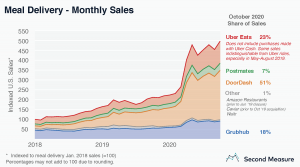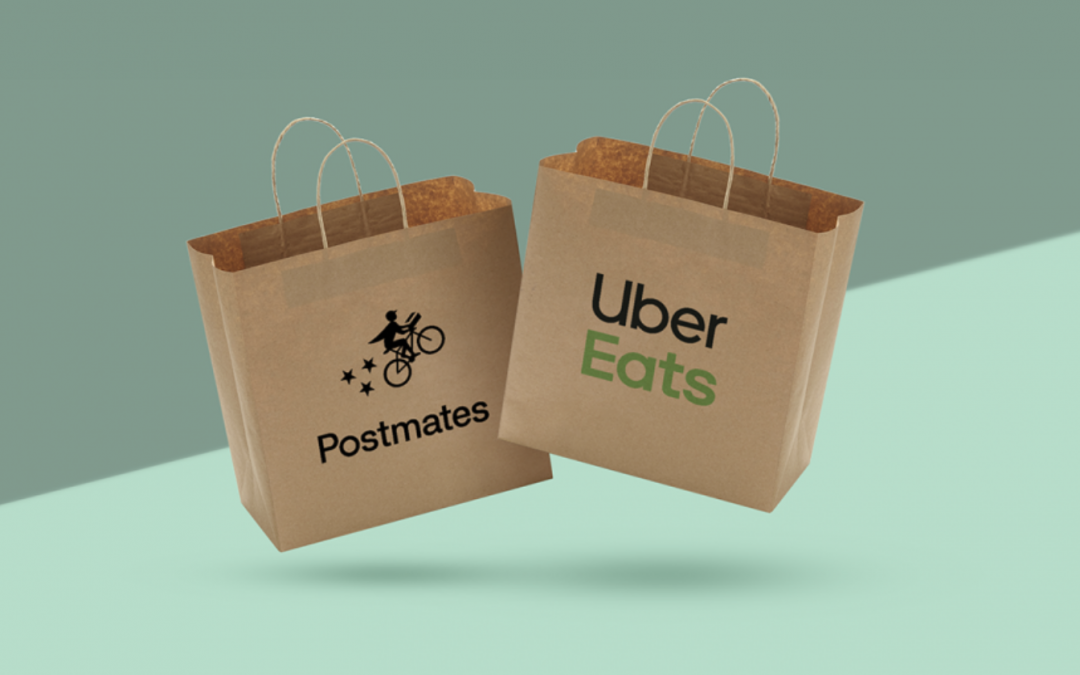As giant DoorDash finalizes its plans to go public, Uber announced it has officially completed its acquisition of Postmates, perennially the fourth-largest U.S.-based third-party delivery provider. According to October market share stats from Second Measure, a combined Uber Eats and Postmates would capture 30 percent of the U.S. restaurant delivery market, which pales in comparison to DoorDash’s 51 percent.

Postmates CEO Bastian Lehmann speaking with Food On Demand Editor Tom Kaiser during this year’s Food On Demand Conference.
Wrapping up this all-stock transaction, Uber Eats and Postmates have now begun the process of integrating their U.S. operations with the intent that both brands will continue their separate branding.
As previously reported, the transaction brings together Uber’s global Mobility and Delivery platform with Postmates’ business in the U.S. to strengthen the delivery of food, groceries, essentials, and other goods. The consumer-facing Postmates and Uber Eats apps will continue to run separately, supported by a more efficient, combined merchant and delivery network.
In connection with the closing, Uber has signaled its commitment to the success of the restaurants and merchants who use its technology to reach customers and delivery people by announcing a national listening tour. These efforts are designed to better understand merchants’ needs, and to continue to develop products, services, and policies that protect their interests.
“Uber and Postmates have long been committed to powering delivery services that support local commerce and communities, all the more important during crises like the one we face today. We’re thrilled to bring these two teams together to continue to innovate, bringing ever-better products and services for merchants, delivery people, and consumers across the country,” said Uber CEO Dara Khosrowshahi.

U.S. delivery market share in October 2020 from Second Measure.
“We built Postmates to empower local commerce and bring the best of your city to your home, especially in cities like Los Angeles and across the southwest,” said Bastian Lehmann, co-founder and CEO of Postmates. “I’m confident that alongside Uber Eats we will create even more opportunities for our customers, continue to drive growth for our merchants, and deliver unique earning opportunities for our Postmates.”
Compared to its primary competitors, Postmates delivers more than just food. While other delivery providers have recently inked deals with pharmacies and retailers as they diversify their offerings, Postmates has long been known for its grocery, convenience store and other verticals its drivers deliver.
Based in San Francisco, just like Uber, Postmates has outsized influence in the critical Southern California market, and the brand has become a pop culture touchstone, with many celebrity cameos featured in the brand’s marketing and social media channels.
In a blog post expounding on its plans to integrate the two brands, Uber said it will prioritize transparency with restaurants and other merchants on the platform.
Going forward, this means helping merchants grow their businesses, and providing them with the tools and products they need to reach their customers on their own terms,” the post read. “We believe merchants deserve transparency in contracts and pricing structures and control over how they choose to partner with us—and we’re committed to giving them that control. Merchants are also right to expect our dedication to high levels of quality and safety; Uber has long stood for safety, and we’ll continue to do so in partnership with Postmates.”


